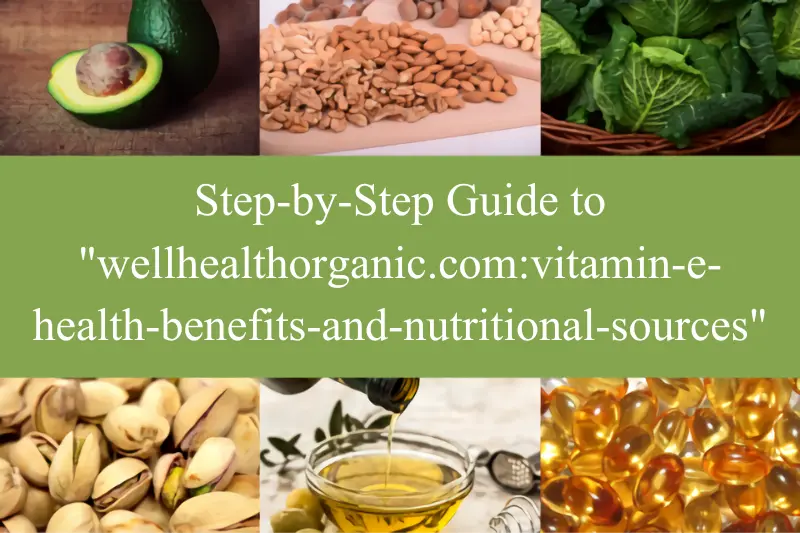Welcome to WellHealthOrganic.com, your trusted source for valuable insights into health and wellness. Today, we delve into the wonders of Vitamin E, exploring its myriad health benefits and the best natural sources to incorporate into your diet. Join us on a journey of discovery as we uncover the secrets of this essential nutrient and its role in promoting overall well-being.
Understanding Vitamin E:
Vitamin E is a group of fat-soluble antioxidants that play a crucial role in protecting cells from damage caused by free radicals. These harmful molecules can contribute to various health issues, including heart disease, cancer, and premature aging. Vitamin E works by neutralizing free radicals, thereby reducing their harmful effects on the body.
Health Benefits of Vitamin E:
- Powerful Antioxidant: Vitamin E is renowned for its potent antioxidant properties, which help protect cells from oxidative stress and damage. By neutralizing free radicals, Vitamin E supports overall cellular health and function.
- Heart Health: Studies have shown that Vitamin E may help reduce the risk of heart disease by preventing the oxidation of LDL cholesterol, often referred to as “bad” cholesterol. By inhibiting the formation of plaque in the arteries, Vitamin E supports cardiovascular health and may lower the risk of heart attacks and strokes.
- Skin Health: Vitamin E is a popular ingredient in skincare products due to its ability to nourish and hydrate the skin. It helps protect the skin from environmental damage, such as UV radiation and pollution, and promotes healing and repair. Vitamin E can also reduce inflammation and soothe irritated skin conditions, such as eczema and psoriasis.
- Immune Support: Vitamin E plays a vital role in supporting a healthy immune system by enhancing the function of immune cells and promoting the production of antibodies. By bolstering immune function, Vitamin E helps the body fight off infections and illnesses more effectively.
- Eye Health: Antioxidants like Vitamin E may help reduce the risk of age-related macular degeneration, a leading cause of vision loss in older adults. Vitamin E protects the cells of the eyes from damage caused by free radicals, thus preserving vision and eye health.
- Brain Health: Some research suggests that Vitamin E may play a role in cognitive function and brain health. It has been linked to a reduced risk of Alzheimer’s disease and other neurodegenerative disorders, although more studies are needed to confirm these findings.
Nutritional Sources of Vitamin E:
While Vitamin E supplements are available, it’s always best to obtain nutrients from natural food sources whenever possible. Here are some of the best dietary sources of Vitamin E:
- Nuts and Seeds: Almonds, sunflower seeds, hazelnuts, and peanuts are excellent sources of Vitamin E. Snack on a handful of nuts or add them to salads, oatmeal, or yogurt for a nutritious boost.
- Vegetable Oils: Plant-based oils like wheat germ oil, sunflower oil, safflower oil, and olive oil are rich in Vitamin E. Use these oils for cooking, salad dressings, and marinades to increase your Vitamin E intake.
- Leafy Greens: Spinach, kale, Swiss chard, and other leafy greens are packed with Vitamin E, along with other essential nutrients like fiber and folate. Incorporate these greens into your meals by adding them to smoothies, stir-fries, or salads.
- Avocado: Avocado is not only delicious but also a great source of Vitamin E. Spread avocado on toast, add it to salads or smoothies, or enjoy it as a healthy snack on its own.
- Fish: Some fatty fish, such as salmon, trout, and mackerel, contain Vitamin E. Include fish in your diet regularly to reap the benefits of this essential nutrient, along with omega-3 fatty acids and protein.
- Fortified Foods: Many cereals, juices, and other processed foods are fortified with Vitamin E. While these products can contribute to your daily intake, it’s best to focus on whole, unprocessed foods for optimal nutrition.
Essential Properties of Vitamin E
- Antioxidant: Neutralizes free radicals, preventing cell damage and oxidative stress.
- Strengthens the immune system: Contributes to the normal function of immune cells and protects against infections.
- Protects cardiovascular health: Reduces the risk of heart disease by decreasing the oxidation of LDL (“bad”) cholesterol.
- Maintains skin health: Promotes skin elasticity and hydration, delaying the appearance of wrinkles and signs of aging.
- Enhances eye health: Prevents age-related macular degeneration and cataracts.
- Cognitive function: Protects brain cells from oxidative damage and may help prevent neurodegenerative diseases like Alzheimer’s.
Subsection: The Different Forms of Vitamin E
There are several forms of vitamin E, with alpha-tocopherol being the most common and biologically active form in the human body. Other forms include beta-tocopherol, gamma-tocopherol, and delta-tocopherol, each with its unique properties and benefits. Understanding the different forms of vitamin E can help individuals make informed choices when it comes to supplementation or dietary intake.

Vitamin E is a powerful antioxidant that plays a crucial role in maintaining good health. It helps protect cells from damage caused by free radicals, which can lead to chronic diseases such as heart disease and cancer. Additionally, vitamin E is known for its anti-inflammatory properties, which can help reduce the risk of conditions like arthritis and asthma. Furthermore, vitamin E has been linked to improved eye health, as it helps protect the cells in the eyes from oxidative stress.
Research has also shown that vitamin E may have benefits for brain health, as it can help prevent cognitive decline associated with aging. Some studies suggest that vitamin E may even aid in the prevention of conditions like Alzheimer’s disease. Moreover, vitamin E is essential for maintaining healthy skin and hair, as it helps protect against UV damage and promotes skin repair. With all these health benefits, it is clear that incorporating sufficient vitamin E into your diet is crucial for overall well-being.
Top Nutritional Sources of Vitamin E for a Balanced Diet
Vitamin E is a powerful antioxidant that plays a crucial role in maintaining good health. Including vitamin E-rich foods in your diet is essential for proper cell function and overall well-being. Some of the top nutritional sources of vitamin E include nuts, seeds, and green leafy vegetables.
Nuts and seeds like almonds, sunflower seeds, and hazelnuts are excellent sources of vitamin E. Incorporating these into your daily meals or snacks can help ensure you are meeting your daily vitamin E requirements. Additionally, green leafy vegetables such as spinach, kale, and broccoli are also rich in vitamin E and provide a host of other essential nutrients for optimal health.
Understanding the Role of Vitamin E in Boosting Immune System Function
Vitamin E plays a crucial role in supporting our immune system’s function. It is a powerful antioxidant that helps protect our cells from damage caused by free radicals, thereby enhancing our body’s defense mechanisms against infections and diseases. By neutralizing free radicals, vitamin E helps reduce inflammation and promotes the proper functioning of immune cells, such as T cells and B cells, which are essential for identifying and destroying harmful pathogens.
Furthermore, vitamin E has been shown to regulate the immune response by modulating cytokine production and signaling pathways. This can help the immune system differentiate between foreign invaders and healthy cells, preventing autoimmune reactions. Adequate levels of vitamin E in the body are essential for maintaining a robust immune system and overall wellbeing. To ensure optimal immune function, it is important to include vitamin E-rich foods in your daily diet or consider supplementation under the guidance of a healthcare provider.
How Vitamin E Supports Skin Health and Anti-Aging Properties
Benefits of Vitamin E for Skin Health
Vitamin E is a powerful antioxidant that plays a crucial role in maintaining healthy skin. It helps protect the skin from damage caused by free radicals, environmental factors, and UV rays. Vitamin E also supports the skin’s natural healing process, making it effective in treating scars, burns, and skin conditions such as eczema and psoriasis.
Anti-Aging Properties of Vitamin E
Regular consumption of vitamin E can help slow down the aging process and reduce the appearance of wrinkles and fine lines. By neutralizing free radicals, vitamin E helps prevent oxidative stress, which is a major contributor to premature aging. Additionally, vitamin E promotes collagen production, improving skin elasticity and firmness for a more youthful appearance.
Incorporating Vitamin E into Your Daily Wellness Routine
Section 6 focuses on the practical aspects of integrating Vitamin E into your daily routine to promote overall wellbeing. By incorporating this essential nutrient into your daily regimen, you can experience a multitude of health benefits, from supporting immune system function to promoting skin health and anti-aging properties. Including a variety of Vitamin E-rich foods in your diet, such as nuts, seeds, and leafy greens, can help ensure you are meeting your daily recommended intake.
Benefits of Vitamin E Supplements
For those who may have difficulty obtaining enough Vitamin E through diet alone, supplements can be a convenient way to ensure adequate intake. Consult with a healthcare professional to determine the appropriate dosage for your individual needs. Additionally, incorporating Vitamin E-rich skincare products into your beauty routine can help nourish and protect your skin from environmental stressors, promoting a healthy and youthful complexion.
Recipes and Meal Ideas to Increase Vitamin E Intake Naturally
Section 7 of our guide focuses on providing you with delicious and nutritious recipes that can help you increase your vitamin E intake naturally. By incorporating these recipes into your daily meals, you can ensure that you are getting an adequate amount of this essential nutrient to support your overall health and well-being.
Breakfast:
Start your day off right with a vitamin E-rich breakfast by enjoying a bowl of oatmeal topped with sliced almonds and a drizzle of honey. You can also whip up a spinach and feta omelette for a savory twist that provides a boost of vitamin E to kickstart your morning.
Lunch:
For a nutritious lunch option, try a quinoa salad with roasted red peppers, cherry tomatoes, and a handful of sunflower seeds for added vitamin E. Alternatively, you can make a turkey and avocado wrap using whole grain tortillas for a satisfying meal that is packed with essential nutrients for your body.
Conclusion
Vitamin E is a powerful antioxidant that offers numerous health benefits, from protecting against heart disease to promoting skin and eye health. By incorporating Vitamin E-rich foods into your diet, such as nuts, seeds, leafy greens, and avocados, you can support your overall well-being and enjoy a healthier, more vibrant life. Remember to consult with your healthcare provider before making any significant changes to your diet or supplement regimen. Unlock the power of Vitamin E and embrace a lifestyle of wellness with WellHealthOrganic.com.

